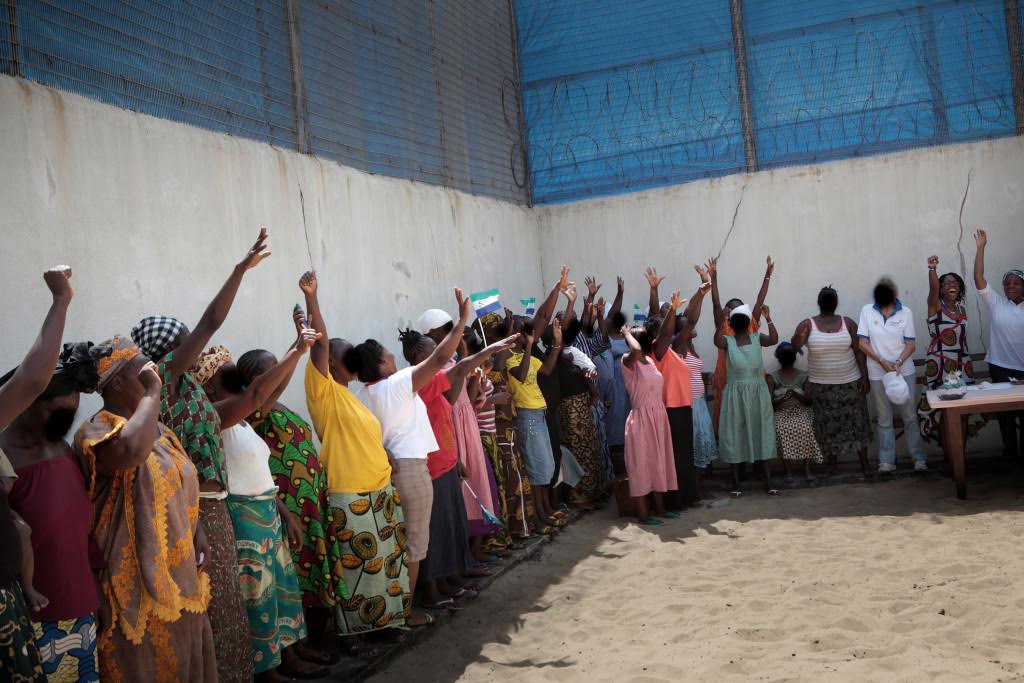FREETOWN, Sierra Leone – Sitting on a plastic chair outside her one-bedroom apartment on the outskirts of Freetown, Fatmata braids her daughter’s hair. As she plaits, tears run down her face. She’s telling the story of how her 12-year-old daughter came to be sexually abused by a 51-year-old neighbor.
“Due to a lack of electricity in my apartment, my daughter usually went to study in [the neighbor’s] apartment, where there is light,” she says. “I never realized that this man had started touching my daughter until she became sickly.”
When Fatmata suspected what had happened, she rushed her daughter to the Rainbo Centre, a Sierra Leonean organization that provides free support and care to victims of rape and sexual abuse. There, nurses discovered that the girl was pregnant.
The case of Fatmata’s daughter is just one of more than 300 incidents of sexual abuse that have been reported to Sierra Leone’s three Rainbo Centre clinics this year. And the numbers are rising: Rainbo Centre clinics have recorded 30 percent more cases of sexual abuse during the first half of 2016 than in the same time period last year. But despite the increasing need for places where abuse survivors can go for counseling and medical care, the Rainbo Centres are under threat, facing the prospect of closing their doors due to lack of funding.
“At the moment we are surviving on a day-to-day basis from funds we raised at our sponsored walk in May,” says Tania Sheriff, executive director of the Rainbo Centre Initiative. “The services we provide are life-saving. The majority of the victims are kids aged mostly between 11 and 15 years. If the centers are shut down, there will be nowhere for them to go to access such services for free.”
Although Sierra Leone is a signatory to international treaties on women and girls’ rights, including the U.N.’s Convention on the Elimination of All Forms of Discrimination Against Women, the full realization of these rights remains a challenge. According to the country’s police force, there were 2,124 official reports of sexual abuse nationwide in 2014 – up from 1,485 in 2013. (Figures for 2015/16 have not yet been released.)
Since 2003, the Rainbo Centre clinics, which were established by the International Rescue Committee, have helped over 14,000 victims of rape and sexual abuse, funded largely by international donors. But those coffers are now running dry, and the government has never sponsored the clinics’ work.

According to Sheriff, donors are delaying releasing their money as they assess – or in the case of the Rainbo Centre, reassess – the organizations they may want to fund. “Donor agencies are being cautious in whom they fund and their priority is value for money, so they are not rushing into funding just any organization,” she says.
For the women and girls in Sierra Leone, the value of the Rainbo Centre clinics comes from having a reliable and affordable source of care and support. If the clinics close, more abuse victims will turn to hospitals for help. But Sheriff says major hospitals, already suffering staff shortages and space limitations, won’t be able to take on that responsibility.
“Even though the law states that sexual assault survivors are entitled to free medical examination and treatment, most hospitals still charge for consultation and treatment,” she says. “Victims are asked to buy drugs outside of the hospital because the health facility does not provide them.”
While women and girls in Sierra Leone could find themselves without a place to help them cope with the effects of abuse, they might also soon be without the resources they need to punish their abusers. Under Sierra Leonean law, rape carries a prison sentence of between 5 and 15 years. But in practice, many cases never make it to court, either because the victims do not have access to legal services or because they are afraid to press charges.
The locally based organization AdvocAid, which was founded in 2006, provides free legal aid to women and girls, representing them both at the police station and in court. Like the Rainbo Centre, it’s mainly supported by international donors, and it’s also having trouble finding funding.
Another part of AdvocAid’s mission is to help women and children in conflict with the law get access to justice, education and reintegration. The organization has already been forced to discontinue some programs, including one that helped reintegrate former female inmates into their communities.

According to Simitie Lavalie, AdvocAid’s executive director, high-profile health crises have pulled the world’s attention away from many human rights issues, taking much of the money with it. “Most funding was diverted to Ebola, and donors have diverted their priority from human rights funding to the health sector, since its weakness was hugely exposed by the Ebola outbreak,” she says.
But as the threat of Ebola wanes, the need for local, grassroots advocates is only growing. Sabrina Mahtani, a human rights lawyer who has worked in Sierra Leone for a decade, says organizations such as the Rainbo Centre and AdvocAid provide holistic services for women and girls and have built up trust and expertise over several years by working consistently in communities that would otherwise lack such resources.
“The imminent shutdown of any of the two organizations will have devastating consequences on victims of sexual abuse,” she says.
